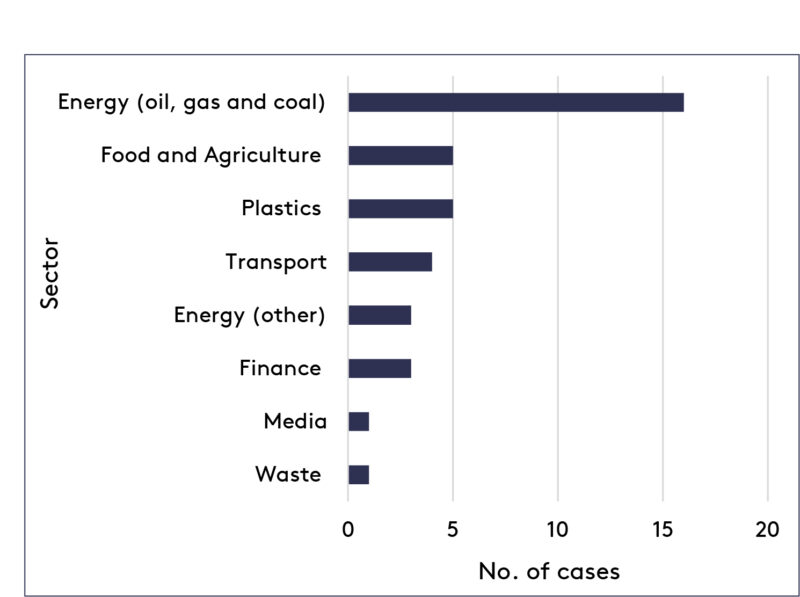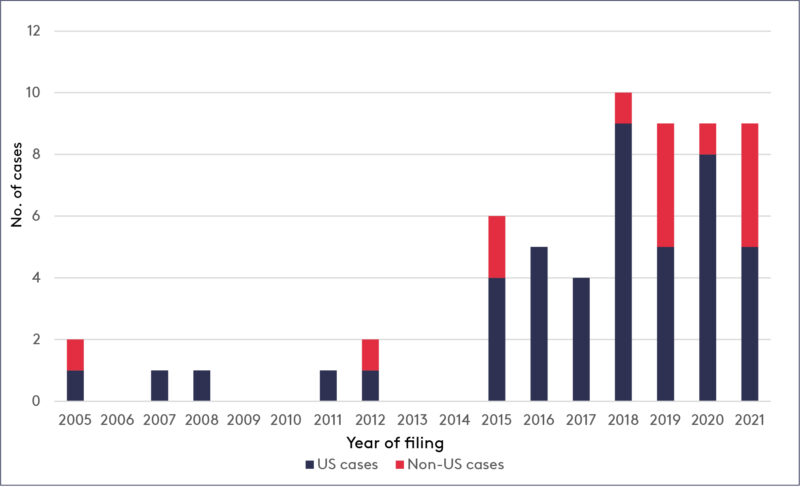Taking companies to court over climate change: who is being targeted?

This commentary is part of a joint series published with the LSE Business Review.
To deepen understanding of climate litigation against private sector actors, Catherine Higham and Honor Kerry analyse climate cases filed in 2021 against companies in different sectors and consider what the future holds. They find that that while fossil fuel companies remain a primary target of activist litigation, climate litigants are now casting their net more broadly.
Last month the Intergovernmental Panel on Climate Change (IPCC) acknowledged for the first time the important role that climate [change] litigation plays in influencing “the outcome and ambition of climate governance”. When it comes to climate litigation and the private sector, much (though by no means all) of the commentary to date has tended to focus on cases against a handful of companies known collectively as the ‘Carbon Majors’ – these being dubbed ‘the holy grail’ of climate litigation cases. Given these companies’ historic, current and future contributions to emissions, these cases are deserved of attention. But analysis by the Grantham Research Institute suggests that climate change litigation against private actors is starting to become increasingly diverse in terms of the sectors targeted – although quite how diverse is still far from being well understood.
High profile cases against companies involved in food, transport and finance have all made mainstream media headlines in recent months. Trade publications – for example for the automotive industry – are starting to publish pieces on how litigation could shape the future of their sectors. However, there is still little understanding of how the bigger picture of corporate climate litigation fits together.
This commentary takes a closer look at climate cases filed against companies in 2021 to fill in some of the gaps, drawing on the Climate Change Laws of the World database and the US Climate Case Chart.
Corporate cases in 2021: fossil fuel companies still top the list
Of the 193 cases identified as being filed in the calendar year 2021, 38 were filed against private sector actors (often in combination with government actors). This represents a marked increase from 2020, when just 22 cases were filed against companies. All but one of these cases were filed in the United States, Australia and Europe.
Unsurprisingly, fossil fuel companies were the most frequent defendants (Figure 1). Litigants challenged companies on the basis of: misleading claims that they produce clean energy; proposed investment in carbon-intensive projects; failure to adhere to relevant climate change and environmental regulation; and failure to reduce carbon emissions. Cases included allegations that companies had concealed information about their contribution to climate change, and attempts to hold companies liable for the effects of climate change. Of the 16 cases filed against companies in this sector, more than nine were brought against one or more of the Carbon Majors, continuing the well-documented trend from previous years.
Figure 1: Cases against companies filed in 2021 by sector

Note: This graph details the different sectors involved in the 38 climate change litigation cases we have identified as having been filed against companies in 2021.
Interestingly, although the majority of cases against the Carbon Majors have historically been filed in the US, there was an approximate even split in cases filed in 2021 between the US and other countries (Figure 2).
Figure 2: Carbon Majors cases over time, within and outside the United States

Increasing cases against the food and agriculture sector, and against plastics companies
Following cases filed against fossil fuel energy companies, companies in the food and agriculture, and plastics sectors were the most common, with five cases relating to each of these sectors filed in 2021.
Cases in food and agriculture include Envol Vert et al v. Casino, alleging that French supermarket chain Casino’s involvement in the cattle industry in Brazil and Colombia is inconsistent with the French duty of vigilance law. Also in this category is a challenge to the pork producer Danish Crown’s claims of how ‘climate friendly’ its pork is, and three cases brought against oat drink company Oatly, alleging the company has engaged in ‘greenwashing’.
The prominence of the agricultural sector is perhaps unsurprising: climate litigation has often been used as a ‘gap filler’ where climate action is lacking. Despite the major contribution to global greenhouse gas emissions made by agriculture and land use, action in this important sector has been limited to date. The IPCC’s Climate Change 2022 report (Summary for Policymakers) identified that in 2019 approximately 22 per cent of total net anthropogenic emissions came from agriculture, forestry and other land use, but that this sector had the largest gap in investment for mitigation. Given this ongoing investment gap, we expect that litigation in this sector will continue to grow.
In the plastics sector, Last Beach Cleanup v. TerraCycle, Inc. challenged how single-use plastics and other materials that are difficult to recycle were being marketed as ‘recyclable’. Claims about biodegradable plastic have also been challenged in Rosencrants v. Danimer Scientific, Inc. and in a stockholder derivative action against the same company. Coca-Cola has been named as a defendant twice in cases relating to plastics, first in respect of its representations that it is a “sustainable and environmentally friendly company” despite its plastic footprint, and second in relation to its claims about the recyclability of its plastic bottles.
Two more sectors to note: transport and finance
Four cases were filed in 2021 in the transport sector. Deutsche Umwelthilfe (DUH), a German environmental and consumer protection association, brought cases against BMW and Mercedes-Benz, relying in both cases on the German Federal Constitutional Court’s earlier decision in Neubauer v. Germany, in which it determined that the country has a limited total CO2 budget remaining at its disposal. DUH claims that in failing to clearly and irreversibly commit to phasing out the sale of cars with internal combustion engines by 2030, which it argues is necessary for the companies to adhere to their allocated carbon budgets, BMW and Mercedes-Benz are violating the fundamental right to climate protection and impinging upon the rights and freedoms of future generations. A case was also brought against Volkswagen by three youth activists associated with Greenpeace and Fridays for Freedom Germany on similar grounds.
In the finance sector, three cases were filed against private actors last year. These were a complaint filed to Australia’s advertising standards authority against HSBC challenging misleading statements about protections for the Great Barrier Reef, a case seeking the disclosure of climate-related information from the Commonwealth Bank of Australia, and a case against the trustees of the UK’s largest private pension fund arguing that the fund had been mismanaged, in part through over-exposure to fossil fuels. These cases must also be read in the context of cases against public financial institutions, which have become an important area of focus for climate litigants seeking to achieve broad systemic changes by increasing the cost of capital for high emitting activities (see Solana, 2021). These cases reflect the broader global attention on the central role of finance and the finance industry in the transition to a low-carbon economy, particularly following key industry announcements at COP26 last November.
Where next for climate litigation against the private sector?
Last year saw the highest number of recorded climate cases against corporate actors. Litigants appear increasingly to be drawing a connection between ongoing public debates about the contribution that individuals’ consumer and lifestyle choices can make to reducing emissions and widespread concern that industry misinformation and inaction may prevent such choices from making a real difference. While future trends are hard to predict with certainty, the increase in litigation against agricultural companies may suggest that other high emitting sectors such as textiles and shipping may be the next target for litigants.
Catherine Higham is Coordinator of Climate Change Laws of the World and Honor Kerry is an LLM student at LSE. The views in this commentary are those of the authors and do not necessarily represent those of the Grantham Research Institute.

